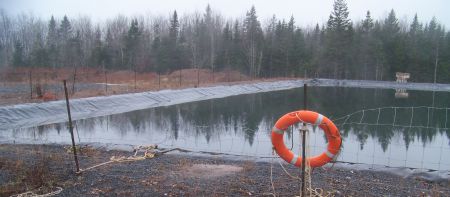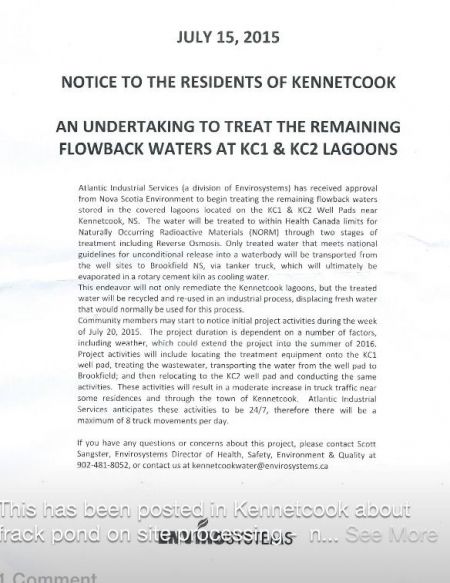Kennetcook, Nova Scotia -- Nova Scotia Minister of Environment Randy Delorey has chosen a method of draining and processing the fracking waste water ponds that have been in Kennetcook for over 7 years. Commenting on the planned end of their long wait, Environment Minister Randy Delorey called it "a significant milestone and good news for Kennetcook residents."
However, the Minister did not approve the continuation of the pilot project that has treated 8 million litres of the same waste water at the Atlantic Industrial Services facility in Debert. Rather, Delorey has approved a variant that will have a greater effect on - and risks for - the local community, with no consultation or advance notice, and with no evidence of assessing those increased risks.
The waste water will instead be treated on-site, potentially for the next year, on a twenty-four hour basis, according to a recent notice posted in the area.
How Did We Get Here ?
With a nominal boilerplate environmental ‘plan’ and virtually no oversight, the province approved the Kennetcook wells that were hydraulically fractured in the spring of 2008. The Department of Environment did not even know there would be fracking waste water held in the 10 million litre ponds adjacent to the two test wells that were hydraulically fractured, and has been trying to play catch up ever since - along with a lot of after the fact revisionism, obfuscation and cover up.
Two governments have acknowledged that Nova Scotia went into this shale gas fracking project without any idea of what it involved - albeit the previous NDP government only grudgingly doing so after a considerable amount of sustained public agitation. The former Dexter government could have early on laid blame with the previous Conservative government that approved the project, but admitting to serious systemic problems have made it difficult to keep the option open for more fracking in Nova Scotia. And while lessons are said to have been learned, the Petroleum Resources Division of the Energy Department still pursues and promotes the hope for unconventional onshore oil and gas development with undiminished missionary zeal.
While the Energy Department 'true believers' pursue making onshore Nova Scotia safe for oil and gas companies, the Department of Environment is left with the unenviable task of cleaning up the messes. If not 'the right way,' then some way.
First Disposal Attempt Stalls
The first three years of the Department of Environment trying to prevail on Triangle Petroleum got nowhere at all. The company held out for disposing of the water their way, and the Department let successive deadlines go by.
Finally, in October 2011, Triangle was dragooned into having Atlantic Industrial Services [AIS] truck the waste water in the two Kennetcook ponds to the AIS' Debert, Nova Scotia, facility. Ironically, AIS had never been approved to treat fracking waste water, and believing the corporate and government Petroleum Resources Department boostering about a coming boom for Nova Scotia in shale gas fracking, AIS had in 2007 submitted an environmental assessment for expansion and construction at the Debert facility so that they could get that approval.
By the time all the drilling and fracking in Kennetcook and Noel was done, the shale gas fever bubble had burst, so AIS shelved that project as soon as it was approved by Environment. Instead they got approval for taking the obligingly reclassified “brine water” in the Kennetcook ponds to dump untreated into the Windsor Sewage Treatment facility that had no capability for treating industrial wastes.
Moving from irony to farce: after AIS and the government found someone willing to take the fracking waste water, Triangle Petroleum decided it wanted to inject the waste water back underground and declined the Windsor option.
With the very generally written approval in hand, AIS used it to truck newly produced fracking waste water from New Brunswick. It took 6 months of seven day a week truckloads bringing over 7 million litres of waste water to the Windsor sewage treatment plant, before the Department of Environment took notice.
While leaving no written records, the Department ended that, and got AIS to bring the remaining New Brunswick waste water to the Debert facility that never been approved for taking fracking waste water. When questioned about conferring this retroactive quasi-approval in 2013, the Department insisted that AIS “had always been approved for treating fracking waste water.”
In October, 2011, AIS began trucking the water from the Kennetcook ponds to the Debert facility. In it’s very belated attempt to catch up about fracking waste water, the Department of Environment discovered that elevated levels of naturally occurring radioactive materials [NORM] are common in returned fracking waste water. Uranium being common in Nova Scotia’s geology, they added the requirement of testing for NORM. But the tests were not done until the trucking had started.
When the NORM test results came back they were elevated, and the trucking was suspended, with 4 million litres of the waste water now held at the Debert facility.
Processing the Fracking Waste Water at AIS Debert
It took another year for AIS and the province to agree on how to process the NORMs, with Environment issuing an Industrial Approval for a pilot project in Debert. AIS had simply released the New Brunswick fracking waste waters with no specific treatment and without ever notifying the municipality of Colchester County that received the waters into their sewer system. But with the public spotlight on fracking now, AIS applied to Environment to release the waste water treated for the NORMs.
The eventual rejection by Colchester County, and by other municipalities since, has had a much greater public profile than the processing itself. That is not a factor in how we come to have an industrial waste processing operation transferred from Debert to on-site at Kennetcook.
But a product of those rejections was that AIS proposed further processing with reverse osmosis to remove chemical compounds that concerned citizens and municipal councillors, and would also reduce the extreme salinity. All of the waste water that was in Debert has now been treated for NORMs, as well as with the more broad spectrum reverse osmosis treatment. After giving up on any municipailty agreeing to take the treated water, even with ‘incentives’ offered, the province agreed that the waste waters could be evaporated in the kiln of Brookfield Lefarge cement plant.
Moving On to the Kennetcook Waste Ponds
The Lefarge solution for disposing of the treated water did have significant opposition. Everyone knows treated water has to go somewhere. Whether or not the Lefarge solution was an acceptable choice, it is the one we have ended up with in Nova Scotia. The treated water that originated in Kennetcook and has been in Debert has now all been evaporated in the Lefarge cement kiln, leaving something under 20 million litres more still in the Kennetcook ponds.
Nova Scotia Environment never said a word about its intensions for the waste water still in the Kennetcook ponds, let alone was anyone in the community consulted. Local member of the East Hants Fracking Oppositon group Pat Vinish spoke to the group's expectations:
“Many of us were less than convinced about the effectiveness of the treatment process, and whether it was a good idea to be disposing of the treated water in the Lefarge plant. But we figured that whether we liked it or not, Environment was going to approve the same process for the Kennetcook ponds: truck the rest of the water to Debert for processing. At least it would be gone from here.”
Vinish explained that the public being informed of the approval for this project four days before it starts raises suspicions about the process:
“We need to be informed of the terms and conditions of the work being performed so we can know where we stand with regards to air emissions, spills, and final handling and disposal of the enriched waste produced.”
“Why are we so disposable that we are exposed the health risks and dangers of this processing in our backyards for more than a year - when there is a purpose built waste handling facility in Debert that has already processed this material?”
The Halifax Media Coop asked the Department of Environment what process was there for examining the implications of processing the waste water at the ponds instead of at the Debert AIS facility. They were also asked why the Minister did not reach out to the community before taking this major and quite unexpected step.
When Minister Delorey came into office in September, 2013, he began immediately addressing what he called “this legacy issue” of the waste water left from the 2008 fracking, and he held a number of public meetings over the following months.
The Department’s reply to the Media Coop query did not mention an internal process of risk assessment for processing in Kennetcook instead of at Debert waste water treatment facility, and attempted to anchor the Department’s decision in what they heard in those public meetings Delorey hosted more than a year ago:
"In light of the public concern expressed during community meetings held last year, the department required the company to treat the wastewater for NORMs at the Kennetcook site prior to transport. We heard the concerns of residents at the community meetings last year. That is why the department required that filtration of the water, at minimum, be conducted at the Kennetcook site prior to transport."
So the community allegedly got a year-long temporarily sited industrial process previously carried out at a waste water treatment facility, because the Department and Minister “listened” to what community members told them and figured that is what they would want. (?)
The author attended all of the several meetings hosted by Delorey in Truro and the Kennetcook area, plus some in Debert where Environment staff were present. At some point in open public meetings just about every concern under the sun was raised. Once or twice someone did talk about the risks of moving NORMs containing waste water in trucks. But selecting this as the supposed reason for “giving the community what it asked for” looks a lot like cherry picking.
This author also lives in the community. No one has ever come here to present choices and asked us if we would like to have the waste water simply trucked out of the community; or would we rather it be processed here in bush sites for a year, then trucked away.
Might the siteing of the industrial processing in Kennetcook have something to do with Atlantic Industrial Services having their cake and eating it too? AIS still gets the business, and the industry credibility, of processing all the fracking waste water and “solving the problem,” without having to tie up their Debert waste water facility.
Heaven forbid they be required to process industrial waste water in their facility approved by the province for that.




